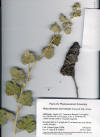|
Malacothamnus densiflorus
|
Malacothamnus fasciculatus |
Malacothamnus marrubioides
|
|
Trees and Shrubs of Kern County (Jan 2013) Malacothamnus—Key (Species poorly defined)—Bush Mallow
1. Plants densely white soft hairy, leaves shallowly 5-lobed; bractlets
nearly
1. Plants with yellow hairs; leaves unlobed to 3-lobed, or 5 lobed;
2. Plants with thick branches and thick leaves; leaves deeply notched at
2 Plants with slender branches and thin leaves; leaves truncated at
base;
Malacothamnus fremontii (Malvastrum fremontii Torrey ex A. Gray 1849) Greene 1906. Fremont's bush mallow. Subshrub covered with whitish hairs, with several to many erect stems to 2 m or more high; flowering Apr–Sep. flowers rose to lavender. Mostly woodland and chaparral below 4,000 ft but reported up to 6,500 ft in Kern Co, Inner Coast Ranges and Sierra Nevada, extending east into the desert in Kern County and then north to Inyo Co., generally from near Red Bluff south to the San Bernardino Mts. Type from interior of California. Kern Co.: Indian Wells Canyon, Erskine Canyon, Fay Ranch Road, Frazier Park, Mill Potrero, and Pine Mountain Club, 1,036–2,103 m (3,800–6,500 ft) based on collections by Burgess, Charlton, Cross, Fraga, Sanders, Shevock, and others. Moe indicated that this species corresponds to M. orbiculatus in Twisselmann. Malacothamnus marrubioides (Malvastrum marrubioides Durand & Hilgard 1854) Greene 1906. Foothill globemallow. Similar in habit to the preceding, differing by the hairs being yellowish in color and by the truncated leaf base, or triangular leaf, in contrast to the heart-shaped leaf (cordate) in the preceding species; however, leaves are described as cordate in JM2. Flowering Jun–Aug, flowers pink (Munz). Rocky slopes, chaparral and woodlands, 1,500–7,000 ft; eastern Transverse Ranges, extending to the southern end of the Sierra Nevada. Type from Fort Miller, Fresno Co. Kern Co.: Of four records in CCH, two are from the Tehachapi Mts., which may possibly occur in the Liebre Mts. in Los Angeles County as suggested by Twisselmann. Two other collections are from the southern Sierra Nevada, one from Squirrel Mountain Valley near the end of Big Springs Road, 1043 m. (J. Wood, 17 May 2009), and the other from Piute Mts. (Purpus, 1 Jun 1897). Malacothamnus orbiculatus (Malvastrum orbiculatum Greene 1891) Greene 1906. Round-leaf globemallow. Differing from the preceding by the thicker branches and leaves. Kern Co.: “Occasional, usually in disturbed rocky places, from Mt. Pinos along the desert facing slopes of the Tehachapi Mountains to the Piute Mountains and the north in the southern Sierra Nevada to near the Tulare Co. line” (Twisselmann), 183–1951 m (CCH).
|
||




